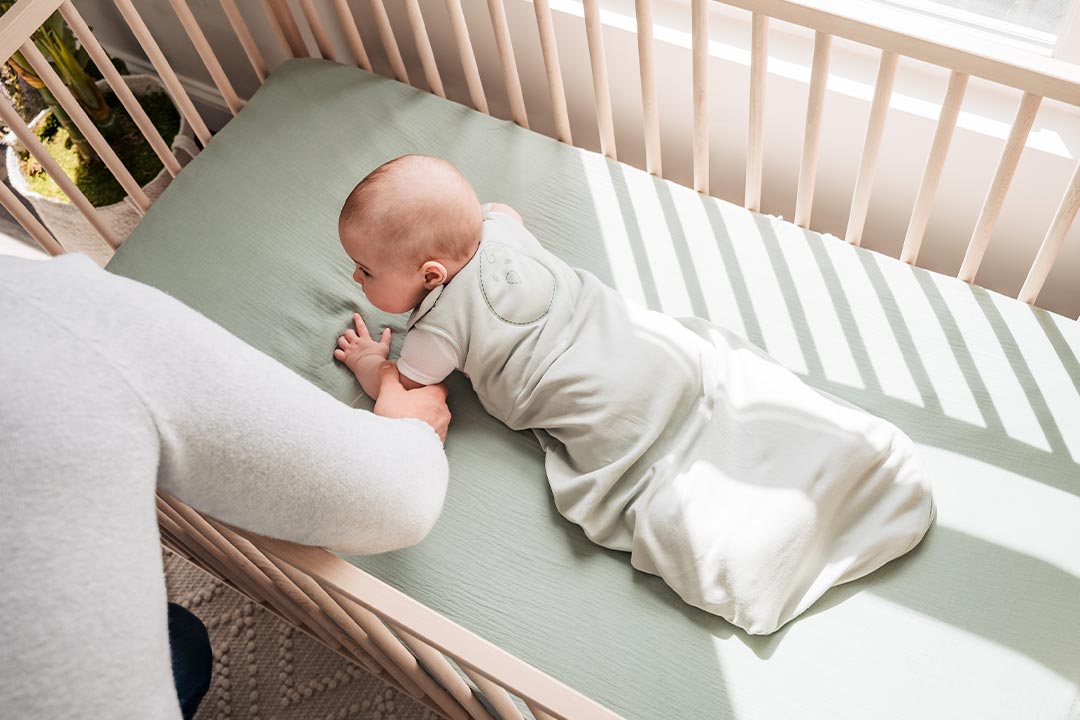Shopping Cart

While people often talk about a baby's first crawl or first steps, their first sign of proper mobility is rolling over independently. This is an exciting time for parents and babies alike - but you want to make sure they're rolling over when they're safe and supervised if they can't roll back over yet.
Here, we'll go over how and why babies roll in their sleep, the best practices for safe baby sleep, and how to keep them from getting into unsafe positions at bedtime.
In this article:
-
Why babies roll in their sleep
-
Safe infant sleep
-
How to prevent rolling during sleep
-
Key takeaways
-
Most asked questions
Why babies roll in their sleep

Babies can start showing signs of rolling over when upper body muscles in their neck, core, arms, and back are strong enough and able to be controlled enough to coordinate certain movements. This is usually at around the 4-month mark, though it's perfectly normal if they start to roll a little earlier or later.
Before they can fully roll over from their back to their tummy, your baby will likely show behaviors like rocking from side to side, kicking their legs more often, and lifting up their head and shoulders a little during tummy time.
In fact, tummy time is a great time to help them practice these new skills, as it will help to further strengthen their muscles in preparation for rolling over independently and other, later milestones.
You may find that once your baby starts rolling, you sometimes find that they roll over in the night or during their sleep. They may sleep through this, or they might start to cry and wake up (waking up the rest of the family too!)
There are a few reasons that your baby may be doing this. They might be feeling restless and wanting to practice their new talents at nighttime, for instance, or they might have dreamed of tummy time! They may even just be rolling around to get comfy, just like you do as an adult.
However, while this is fine past a certain age, tummy sleeping isn't usually advisable for a sleeping baby under a year old for safety reasons.
Safe infant sleep
When it comes to your baby's sleep, you need to be careful and follow guidelines like those provided by the American Academy of Pediatrics to lower the risk of SIDS (Sudden Infant Death Syndrome). There are several rules consistently stated by experts, such as removing stuffed animals and blankets from your baby's crib and using a firm sleep surface.
Beyond maintaining a safe infant sleeping environment, one of the most important guidelines to follow for the first year of your baby's life is to place them to sleep on their back, as this can significantly reduce their risk of suffocation. Therefore, many parents panic when they check on their baby and see that they've rolled onto their tummy!
If your baby is rolling consistently in the night, they're likely able to reposition themselves if they're in an unsafe position. However, rolling over on accident in their sleep is trickier, and may pose more of a safety risk.
This is why it's so important to keep your baby's sleep surface clear - no matter how you put them down, babies can roll around at night, and you don't want their face to become covered by a blanket or toy.
Safe sleep - from the experts
'The guidelines recommend you continue to put your baby to sleep on their back until age 1, even though around 6 months old — or even earlier — they’ll be able to roll over both ways naturally. Once this happens, it’s generally OK to let your little one sleep in this position.
This typically lines up with an age in which the peak of SIDS has passed, although there continues to be some risk until age 1.
To be safe, your baby should be rolling over consistently in both directions, tummy to back and back to tummy, before you start leaving them in their preferred sleeping position.
If they aren’t consistently and intentionally rolling yet but somehow end up on their tummy while sleeping, then yes, hard as it is — you need to gently put them back on their back. Hopefully they won’t stir too much.'
- Alexandra Frost, medically reviewed by Karen Gill M.D. for Healthline
What to do when your baby rolls in their sleep

While young babies under a year old should always be placed to sleep on their back, your baby consistently rolling over onto their front after they fall asleep isn't necessarily anything for you to worry about. However, this is only if you know that they're capable of rolling independently during tummy time or other activities - if it's once in a while and done in their sleep, it may be less safe.
There are a few precautions you can take when it comes to having a wannabe tummy sleeper to make sure they're as safe as possible through the night:
Tummy time

This is one of the first exercises your little one will ever have, and it's vital for their physical development. A rolling baby is significantly safer at night once they're able to roll back onto their back again without issue, as you know they're able to move out of an unsafe position if they need to.
As tummy time helps to strengthen the same muscles that your baby uses to start rolling, making sure you do it every day can bring your baby closer to independent rolling, and therefore safer tummy sleeping.
Avoid positioners
You may have seen foam wedges and baby sleep positioners advertised that claim to keep your baby in place while they sleep, preventing them from rolling over in the night. While they may sound good, they can actually be dangerous when left in an unattended baby's crib for a number of reasons.
As well as allowing babies to use them to escape their crib at night, these positioners potentially contribute to sleep-related infant deaths by posing a suffocation risk, as they don't effectively prevent your baby from rolling in place. Instead, you should follow the AAP safe sleep practices and always keep the crib clear.
Gently roll them back

As any parent will know, babies grow up faster than you can imagine, and you'll be surprised at just how quickly they're rolling, then crawling, and then walking! The period of time in which a baby rolls over in their sleep before they can fully roll independently is typically relatively short, lasting only a couple of weeks.
Therefore, some parents feel best just spending a few nights rolling them back over when they check in on them - sometimes the most effective solutions are the simplest!
Switch to a sleep sack

Regardless of how consistently they roll or how long they've been rolling for, as soon as your baby starts to show signs of being able to roll, you'll need to stop swaddling them when they sleep. However, that doesn't mean you need to go completely cold turkey!
Our Nested Bean Zen Sack features a gently weighted pad that provides a similar feeling of safe pressure to swaddling and mimics your soothing touch to help your little one feel safe and snug while they drift off to sleep. Check out what this Zen Mom had to say about our favorite sleep sack:
'We transitioned our 2-month-old into this Nested Bean Sleep Sack and he began to sleep a continuous 8-10 hours a night! The first night he woke up after 5 hours but with a simple rock and forth, he went back to bed and stayed asleep for another 3 hours.
On the second night he stayed asleep and he’s been sleeping through the night ever since. We’ve been using this Sleep Sack for about 2 weeks now and it has been so great!'
- Maryhelen R., Zen Sack review
Baby rolls in sleep - key takeaways
Though it's exciting whenever your baby takes another step towards moving independently, it can also be nerve-wracking, especially when you feel as though it's outside of your control. Luckily, your baby rolling at night is generally nothing to worry about and is most often a sign of healthy development. Just try to remember these key takeaways when it comes to taking care of a baby who rolls at night:
-
Your baby will start showing signs of rolling when muscles in their upper body - specifically their arms, neck, core and chest - are developed enough
-
You should stop swaddling when your baby starts rolling, or even just shows signs of rolling; this is because a swaddled baby cannot roll out of an unsafe position as easily
-
Keep your baby's sleeping space clear to reduce any risk of SIDS if they roll over during sleep
-
Avoid sleep positioners - rather than reducing the risk of SIDS from rolling, they actually create a whole other risk and don't prevent your baby from moving effectively
-
Remember, this will only be a problem for a short period of time, and your baby will most likely be confidently rolling all on their own in a matter of weeks, at which point they can tummy sleep more safely (just keep placing them on their back)
Most asked questions about baby rolling over in sleep
Is it OK if my baby rolls over in sleep?
This depends on whether your baby is able to roll over independently from their back to their stomach and back again - if they are, they should be safe if they roll onto their tummy at night. Otherwise, sleeping on their front may pose a risk of SIDS, particularly if there are any blankets or stuffed animals in the crib with them (you should keep their crib clear until their first birthday).
What should I do when my baby rolls over in his sleep?
If you've found that your baby has rolled over in their sleep and didn't wake themselves up, you might want to gently roll them onto their back again if it hasn't happened before, or has only happened irregularly. However, if your little one has been rolling independently for some time, they may be safe tummy sleeping if they intentionally roll onto their stomach - just carry on placing them on their back to sleep until they're at least a year old.
You should also stop swaddling if you notice your baby rolling over in their sleep. Instead, you can try a sleep sack like our Zen Sack, which is gently weighted to provide swaddle-like comfort and help your baby fall asleep.
How do I stop my baby rolling over in sleep and waking up?
Honestly, there isn't really an effective way to stop your baby from rolling at night - if they want to roll, they're going to roll! In fact, you should avoid products that claim to keep your baby in place as they sleep - these sleep positioners and wedges can increase your baby's risk of SIDS.
Instead, the best thing you can do is make sure their sleep environment is safe in case they do roll over. The AAP recommends that you keep your baby's crib clear of objects like blankets and pillows and place them in a sleep position on their back for the first year of their life, so follow these guidelines.
Do babies practice rolling in their sleep?
Many parents find that when their little one reaches a new developmental milestone, whether it's crawling, talking, or standing, they - unfortunately - love to practice it when they should be sleeping! Rolling is no exception to this, and you might find that your baby wants to kick their legs, rock back and forth, and roll around instead of going to sleep.
If this is the case, you might want to consider increasing the amount of tummy time your baby has during the day. By giving them a good amount of time to practice this new skill, they might feel more settled and ready to sleep during naps and at night.
If your baby is struggling to fall asleep at night in general and can no longer be swaddled, you may want to try a sleep sack like our Nested Bean Zen Sack, which is designed with a gently weighted pad to simulate your soothing touch and help them feel calm enough to go to sleep.
Why is my baby rolling over in sleep and crying?
If you're awoken in the night by your baby lying on their front and crying, it's likely that they've managed to roll over in their sleep - and that they woke up not knowing how they got in a new position! While most babies practice their rolling when they're awake, some don't realize that they've developed this skill right away, and may accidentally roll over as they snooze.
If this happens, you can simply soothe your baby and place them gently onto their back again - they'll most likely be able to roll over confidently and independently in a few short weeks, so hang in there!

